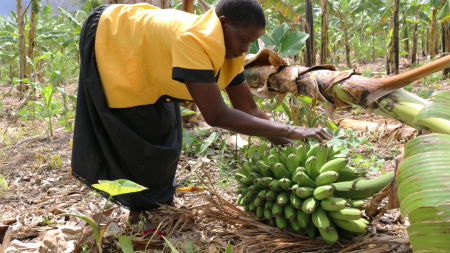Transforming the global food system demands a fundamental rethinking: CIFAR report
 Transforming the global food system requires more than incremental improvements – it demands a fundamental rethinking of how food is produced, distributed, consumed and governed, according to a report from CIFAR.
Transforming the global food system requires more than incremental improvements – it demands a fundamental rethinking of how food is produced, distributed, consumed and governed, according to a report from CIFAR.
“The complexity of the challenges ahead – from environmental degradation to shifting dietary patterns – means that no single discipline, policy or innovation will suffice,” the report says.
A deeper, more integrated understanding of food system dynamics is essential, one that brings together diverse perspectives from across the natural and social sciences, Indigenous knowledge systems, and global policy frameworks. (Photo above courtesy the International Potato Center).
In 2024, CIFAR brought nine international, interdisciplinary food experts together in a “Discovery Panel” to explore the complex changes related to the future of the global food system. Their report, The Future of Food, provides an overview of their discussions and recommendations to CIFAR for potentially transformative future areas of research.
The panel was chaired by Deborah Buszard (University of British Columbia), who was joined by Kyle Bobiwash (University of Manitoba), Simon Bush (Wageningen University), Hugo Campos (International Potato Center), Mariaelena Huambachano (Syracuse University), Peter Phillips (University of Saskatchewan), Alon Shepon (Tel Aviv University), Éliane Ubalijoro (CIFOR-ICRAF – Center for International Forestry Research - World Agroforestry), and Anna Zeide (Virginia Tech).
 “Food defines who we are – it carries memories, traditions and shared experiences,” Hugo Campos (photo at left) said in a CIFAR interview with Alison Rutka, CIFAR’s director of communications.
“Food defines who we are – it carries memories, traditions and shared experiences,” Hugo Campos (photo at left) said in a CIFAR interview with Alison Rutka, CIFAR’s director of communications.
“Global food systems can no longer be viewed through simplistic divides, where undernourishment and obesity are problems in less developed and wealthier countries, respectively,” Campos said.
Across the globe food insecurity is rising, and climate change is intensifying, becoming more unpredictable, the panel’s report says. Even highly developed countries currently face food insecurity for segments of their populations.
Despite recent progress, about 670 million people remain undernourished, over 15 times Canada’s entire population – “a moral crisis of staggering proportions,” Campos said.
The root cause is that failing food systems are unable to deliver nutritious, sustainable and affordable diets for all, he added.
In Canada, in 2022 16.9 percent of Canadians were food insecure, compared with 12.9 percent in 2021, according to Statistics Canada. Overall, the proportion of individuals in households experience food insecurity has increased by 5.3 percentage points from 2018 to 2022.
In 2022, of people aged 15 years and older, 33 percent of First Nations people living off reserve and 23.8 percent of Métis experienced food insecurity.
Data collected by PROOF research program at the University of Toronto shows almost 2.5 million children in Canada lived in food-insecure households, or about one-third of all children in the country.
According to CIFAR’s report, Sustainable Development Goal #2, Zero Hunger, shows the most regression among all United Nations’ Sustainable Development Goals.
Declining biodiversity is impacting traditional agricultural lands and driving rapid change in urban food systems.
Pathogens are spreading and evolving, presenting new risks to crops and livestock. The issues facing the global food system are of urgent concern today and growing in importance and complexity, making them critical to our future.
Food – its production, transportation and processing – is responsible for the greatest impact humans have on this planet, the report notes.
Using 50 percent of habitable land and accounting for 70 percent of freshwater use, food production, transportation and processing produces one-third of all anthropogenic greenhouse gas emissions. “Considering deforestation, soil degradation, and use of water and fossil fuels, it dwarfs all other human activities in terms of transforming the planet.”
Livestock production uses nearly 80 percent of global agricultural land while providing only 18 percent of global calories and 38 percent of the world’s protein, according to the report.
The extensive land required for grazing and growing feed crops like soy and maize drives deforestation, biodiversity loss, and ecosystem disruption, releasing large amounts of carbon stored in forests and soils.
“These land-use changes degrade soil health, reducing its capacity to sequester carbon, further exacerbating climate impacts.”
One of the greatest solutions to issues of soil degradation is agroforestry – leveraging the power of trees on farms, as windbreaks or riparian buffers, or incorporating them directly into crop or animal production practices, the report says.
When implemented at scale, agroforestry could increase food security for 1.3 billion people, it can reduce soil erosion by 50 percent, and it can increase soil organic carbon by 21 percent. It can also contribute to significant emission reductions and healthy, biodiverse ecosystems.
Transformation required in numerous areas across entire food systems
The global food system problems “demand transformation across entire food systems, from production and processing to policy, finance, distribution, consumer behaviour and waste management,” Campos said.
The report notes that at every level of the food system challenges exist: immediate issues of adaptation to climate change, environmental degradation, the scarcity of water resources and the urgent need to reduce the carbon footprint of the food chain, to labor inequities, animal welfare, impacts of transportation and processing, increasing concerns regarding food insecurity, poor nutrition, and rising levels of diet-related disease.
“There is a need for greater understanding of the dynamics of these complex and diverse aspects of the global food system, in order to build a more sustainable and just future food system,” the report says.
Long-term, interdisciplinary research will be crucial for uncovering the underlying mechanisms that shape food system resilience, equity and sustainability. “By approaching food not just as a commodity but as a critical interface between human and planetary health, we can generate the knowledge needed to drive meaningful, systemic change.”
According to the report, a global perspective is equally vital, recognizing that local food practices both influence and are shaped by international governance, economic forces and environmental shifts.
Reimagining food production requires a systems-level approach that aligns agricultural practices with planetary boundaries, while addressing a growing global population’s nutritional and economic needs, the report says. This involves blending food and Earth systems to balance productivity with ecological sustainability.
Innovation is essential, particularly in diversifying food production systems, the report says. Advances in genomics and the development of novel crops and crop systems, the expansion of aquatic food systems and the introduction of new climate-resilient crops, hold significant potential.
Incorporating indigenous knowledge of traditional practices and management of land and water resources is also key. Integrating fundamental research across these key areas can address critical issues, such as food security, emissions reduction, ecosystem restoration and overall food system resilience.
Campos recommended a two-tier approach: First, design an impact cluster gathering top global minds, both Canadians and from elsewhere, to address critical gaps in the biological and social sciences and business aspects of food.
Second, generate and support action-driven dialogue by leveraging CIFAR’s convening power to transform scientific evidence into concrete policy solutions – from finance to social protection to private sector engagement.
“Combining cutting-edge science with practical implementation ensures that research translates into real-world impact,” Campos said.
Says the report: “The next decades present an opportunity to reshape the food system in ways that align with both ecological limits and human well-being – an opportunity that will only be realized through sustained, collaborative and forward-thinking research efforts.”
Building on findings of the report, CIFAR will launch a Call for Discovery Workshops in September 2025 under the newly announced CIFAR Arrell Future of Food Initiative. Discovery Workshops aim to encourage and provide an opportunity for new, interdisciplinary and international research networks to collaborate in response to foundational questions identified in the report.
The Future of Food Discovery Panel and its final report were supported by the Arrell Family Foundation.
See also:
R$
Events For Leaders in
Science, Tech, Innovation, and Policy
Discuss and learn from those in the know at our virtual and in-person events.
See Upcoming Events
You have 0 free articles remaining.
Don't miss out - start your free trial today.
Start your FREE trial Already a member? Log in
By using this website, you agree to our use of cookies. We use cookies to provide you with a great experience and to help our website run effectively in accordance with our Privacy Policy and Terms of Service.



